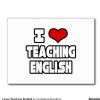I can �t understand this site.
Why are people against someone asking for help!!!!
Is it the ego of some people getting in the way of learning and improving their craft?
I have offered many times to help people with their English and yet..do they?
Of course you should use the forum if you have a problem, grammar or otherwise. How else can you improve? Good on you Ohlala esl !
I downloaded a worksheet the other day with so many errors it was not funny. After correcting it for my personal use I offered, by PM, to send it to the contributor and got a very polite "no, thank you".
What are people afraid of....that we will think bad of you.... get over it.
I, for one, am only trying to help!
None of us like giving students worksheets with grammar mistakes in them. I used a great one the other day which encouraged them to always put "to" after "ought" even in the negative. Wrong, the "To" gets dropped in the negative. I looked stupid!
Now I appreciate this was my fault for not checking the worksheet carefully beforehand but I worry about how many of us are teaching students our own errors and acting as though these concepts of ours are gospel.
I �ve said before and I want to say it again.
Forget the rules and find out what real people actually say. ...use the native speakers......
English is constantly changing..by the time the rules are confirmed, they could be out-of-date.
Think of the slogan MacDonalds use "I �m loving it". It �s totally against the rules...no continuous form for the verb "love" but try saying that to the millions of people worldwide who are now using this expression.
Cheers, Joy
PS If my students find my mistakes I give them a sweet. Can you find any?











